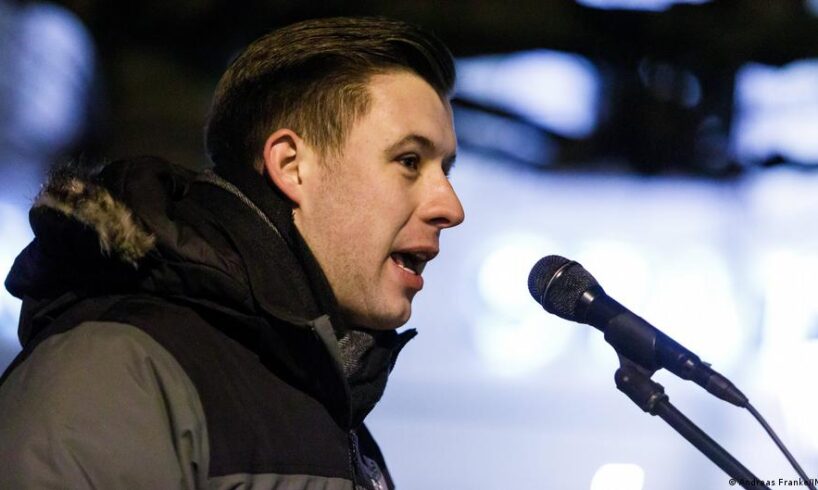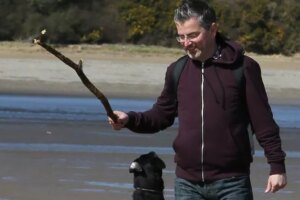
Jean-Pascal Hohm is young and well-groomed: a neatly shaved neck, a side part, tidy clothes, and an affable demeanor. When he takes to the podium in the Brandenburg state parliament, the 28-year-old lawmaker usually sports a suit and tie.
Hohm is far from being a household name across Germany, but that could soon change. He is slated to head the new youth organization of the far-right Alternative for Germany party (AfD), which is to be founded on November 29 and 30 in the city of Giessen, in the central state of Hesse.
In the run-up to the event, he gave an interview to the right-wing media outlet Junge Freiheit TV, where he outlined the organization’s objectives: “We want to be a training ground for the party’s future leaders,” Hohm said. “We want to develop the officeholders, the elected representatives, and hopefully also the future members of the government,” Hohm continued, indicating that the AfD youth organization plays an important role in paving the way for the party’s rise to power.
How much of a neo-Nazi party is the German AfD?
To view this video please enable JavaScript, and consider upgrading to a web browser that supports HTML5 video
AfD dreams of an absolute majority
In 2026, five important regional elections will be held in Germany. The AfD has been riding high in the polls for months. In eastern Germany, it has risen to become the strongest party. In Saxony-Anhalt, it is polling at 40%, which indicates that it might even be able to form a government without a coalition partner after September’s election.
On its path to power, the AfD decided to dissolve its former youth organization, the Junge Alternative (Young Alternative), at the beginning of 2025. Its members had made the headlines with extremist statements and frequently got embroiled in scandals, causing a headache to the party leadership. The JU was formally an association without any party affiliation. In fact, party membership in the AfD was not even a prerequisite for membership in the JU, so the party had no way to sanction what it saw as undesirable behavior.
The JU had been in the crosshairs of the German security authorities, who classified it as “confirmed far-right extremist” due to its close relations with anti-constitutional organizations such as the Identitarian Movement and with suspected right-wing terrorist groups including one called the “Saxon Separatists.” Legal and political analysts saw the JU on the verge of being banned as unconstitutional, which would have had repercussions for the AfD as a whole. German security authorities have collected evidence showing that the AfD acts against core principles of the German constitution: The party’s campaigns against Muslims and immigrants violate the principle of equality enshrined in the Basic Law. Critics have been calling for a ban on the AfD for years. Had the party’s youth organization been banned, this would have helped their cause.
The AfD has been vehemently rejecting such accusations for years. “The AfD is trying very hard to counter this categorization as right-wing extremist and to ridicule the whole idea,” political scientist Anna-Sophie Heinze from the University of Trier told DW. “But at the same time, it also fears the possible consequences.”
The reorganization of the party’s youth wing thus appears to be a primarily strategic move: under the umbrella of the parent party, the new grouping can expect to obtain better funding and professional support to get involved, for example, in social media campaigning in the run-up to next year’s elections.
Why is the far-right AfD so powerful in eastern Germany?
To view this video please enable JavaScript, and consider upgrading to a web browser that supports HTML5 video
Will the new youth organization remain far-right?
The crucial question is: how much far-right extremism will there be in the newly founded youth organization?
“I don’t think the new youth organization will have absolutely no contact with the Identitarian Movement or the far-right front,” says political scientist Anna-Sophie Heinze.
Jean-Pascal Hohm, for example, has a history of close ties to far-right and anti-constitutional associations, in one of which he even completed an internship. In October 2018, he attended a meeting of neo-fascists in Italy. His Brandenburg AfD chapter is considered to be one of the most radical nationwide. Individual members have openly challenged the German constitution, for example, by questioning whether it is even legal for immigrants to obtain German citizenship.
Hohm’s response to such accusations leaves much room for interpretation. In an interview with the right-wing newspaper Junge Freiheit, he said: “I am firmly convinced that the platform the AfD promotes, and also the platform our youth organization will promote, is firmly grounded in the Basic Law.” Critics wonder how to interpret this: Does the party itself stand on the foundation of the Basic Law? Or is it just the written platform in accordance with the words of the constitution?
“Generation Germany” is the name Hohm and his associates want to give the new youth organization. It will be voted on by the members of the weekend conference. Promoting mass deportations from Germany is at the center of the proposed political platform. To avoid alienating voters, AfD politicians usually use the euphemism of “remigration” rather than clearly stating “deportations.”
This article was originally written in German.
While you’re here: Every Tuesday, DW editors round up what is happening in German politics and society. You can sign up here for the weekly email newsletter, Berlin Briefing.





